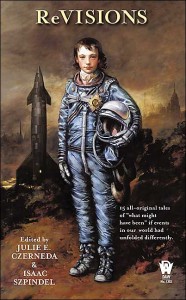 Alternate history stories have a long and honored tradition in the science fiction genre. The great thing about them is that there’s a never-ending number of historical pivotal points that can be expoited, and every writer has a slightly different take on things. In this new anthology, editors Julie Czernada and Isaac Szpindel bring together fifteen stories revolving around the double-edge theme of “What if X was invented earlier/later than in the real world?”
Alternate history stories have a long and honored tradition in the science fiction genre. The great thing about them is that there’s a never-ending number of historical pivotal points that can be expoited, and every writer has a slightly different take on things. In this new anthology, editors Julie Czernada and Isaac Szpindel bring together fifteen stories revolving around the double-edge theme of “What if X was invented earlier/later than in the real world?”
Thus, we have stories like “The Resonance of Light” by Geoffrey Landis, which sees infamous ‘mad scientist’ Nikola Tesla inventing the ruby laser in an attempt to prevent World War I from taking place. Will his invention save the day, or doom the world to chaos and war? One man has the power to affect the fate of millions, but has he truly planned for every eventuality?
Julie Czernada’s “Out of China” posits a world in which the nature of the Black Plague, and the importance of sanitation and hygiene, is figured out in the early 14th Century, thus influencing a very different course of events over the next few hundred years.
In Laura Anne Gilman’s “Site Fourteen,” space exploration is preempted in favor of deep sea exploration, and a government agency called NEREUS seeks to colonize and master the ocean’s depths. However, just as with space travel, there are dangers in exploring the unknown.
Looking at one of history’s greatest inventors, Kage Baker tells a story in which Leonardo DaVinci’s great ideas were used for bloody, warlike purposes. What could the man have accomplished, if he’d actually sought to finish so many of his theoretical creations?
Doranna Durgin’s “A Call to the Wild” is an imaginative examination of a world in which our domestication of the dog failed, leaving us bereft of a valuable ally, and at the mercy of an insidious, all-too-familiar enemy. In “The Terminal Solution” by Robin Wayne Bailey, one of the worst diseases of our time makes its appearance a century earlier, plaguing a society decidedly unready for its ravages.
John G. McDaid shows us a rather familiar scenario in a most unlikely setting, in “The Ashbazu Effect.” Quite simply, what if the Sumerians had invented the printing press? They too might have had would-be writers, editors, and publishing houses, and a need for fiction. Kay Kenyon’s “The Executioner’s Apprentice” gives the secret of genetic sequencing to the Mayans, and Jay Caselberg’s “Herd Mentality” uses cloning to give the world several hundred Einsteins, all of whom have an idea of how to guide society’s progress.
The worst thing you could say about an anthology like this would be that it’s slightly formulaic, and that some stories spend more time reflecting on the cause of historical change than they do on the plot itself. However, that’s actually not the case; there are some fantastic stories to be found in this collection, especially “The Executioner’s Apprentice” and “Site Fourteen.” As far as bang for your buck, ReVISIONS is definitely a good selection of stories, sure to please any alternate history afficionado.
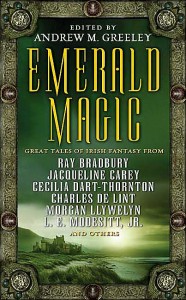 In Emerald Magic, the magical green hills of Ireland come alive in 15 stories focusing both on the long tradition of Irish fantasy, and on the creatures of Faerie which are so closely associated with Irish myth. The lineup represented in this collection is an all-star one, featuring some of the very best names in fantasy today.
In Emerald Magic, the magical green hills of Ireland come alive in 15 stories focusing both on the long tradition of Irish fantasy, and on the creatures of Faerie which are so closely associated with Irish myth. The lineup represented in this collection is an all-star one, featuring some of the very best names in fantasy today.
Charles de Lint’s “The Butter Spirit’s Tithe” is classic de Lint: seven years ago, a musician got in trouble with a butter spirit, a rather cranky sort of household fairy, and now the butter spirit has come to collect what he believes is rightfully his. Only a desperate confrontation between mortal and fairy will end this once and for all, and it’ll take cunning, true love, and determination to win through. As always, de Lint writes some of the best modern fairy tales around, though his characters have become progressively less surprised by the unusual events which befall them. While I never balk at new de Lint stories, and often turn to them first when I spot them in magazines or anthologies, I have to wonder if there are any normal people left with whom we can sympathize in his world.
On a more humorous track, Diane Duane looks at an entirely different Irish myth in “Herself.” Legends have power, and sometimes, they come to life on their own. Featuring leprechauns, conveyor-sushi bars, the fate of the shoe industry, Ireland’s only superhero, the ghost of James Joyce, Anna Livia (goddess of the Liffey) and a diabolical green tiger, it’s a fairy tale inspired by a few too many at the pub. Pure genius. I found myself reading bits of this one out loud just to see how it sounded.
Ray Bradbury’s “Banshee” is a love story with a poignant, midnight edge to it, in which unfulfilled desire has kept a spirit trapped on Earth for far too long, far beyond the point of hope and redemption. Fred Saberhagen’s “A Drop of Something Special in the Blood” is a vampire story with an unusual genesis, suggesting an inspiration for a much more famous vampire tale.
Andrew Greeley turns in a story of his own: “Peace in Heaven?” in which the forces of Heaven and the creatures of the Fae finally conduct some long-overdue peace talks. Once they were all on the same side, until a war split them along ideological lines. A different kind of peace talks turn violent in Jane Yolen and Adam Stemple’s “Troubles.” Of all the stories in this volume, this is the one I want to see more of. Stemple and Yolen touch only briefly upon a secret world of an ongoing war between the Fae Courts in the New World, but what little we see hints at so much more, of a much greater plan.
Other contributors to this collection include Jacqueline Carey, Cecilia Dart-Thornton, Elizabeth Haydon, Tanith Lee, Jane Lindskold, Morgan Llywelyn, L.E. Modesitt, Jr, Judith Tarr, and Peter Tremayne. Most of them are known for their takes either on fairy tales (such as Dart-Thornton’s brilliant Bitterbynde trilogy) or Irish myth (like Morgan Llywelyn’s beautifully-crafted novels.) Emerald Magic is an outstanding anthology with plenty to please even the most discerning of readers. If you like Irish-flavored fantasy or fairy tales of the classic variety, you can;t go wrong here.
 “Every dog has his day,” goes the old saying. And now, at last, the canines take center stage in an all-new anthology dedicated to the dogs of fantasy and science fiction. While fantastic felines still have a considerable lead, with no less than five, and probably closer to ten, anthologies to call their own, there have been very few looks at man’s supposed best friend. Well, in Sirius the Dog Star, Alexander Potter has gathered together sixteen stories that demonstrate why dog is man’s best friend, whether it’s on Earth, in space, or in realms beyond the imagination.
“Every dog has his day,” goes the old saying. And now, at last, the canines take center stage in an all-new anthology dedicated to the dogs of fantasy and science fiction. While fantastic felines still have a considerable lead, with no less than five, and probably closer to ten, anthologies to call their own, there have been very few looks at man’s supposed best friend. Well, in Sirius the Dog Star, Alexander Potter has gathered together sixteen stories that demonstrate why dog is man’s best friend, whether it’s on Earth, in space, or in realms beyond the imagination.
In “Finding Marcus,” by Tanya Huff, one faithful pooch journeys from world to world to world via transdimensional Gates, forever seeking his lost master and friend, like the Flying Dutchman’s favorite dog. The inclusion of a streetsavvy crow could spell the end to Rueben’s loneliness, but will it bring him closer to Marcus? It’s unfortunate that this story reads like a vignette, because I really want to see more of Reuben’s quest.
Rosemary Edghill’s “Final Exam” partners a man with a specially-trained dog to perform an invaluable service: determining which criminals are redeemable, and which will be executed by the state. It’s a hard job, but necessary, and the judgment of the dog is infallible, right? The heroine of Bernie Arntzen’s “Precious Cargo” is a space-traveling merchant with a particular dislike of dogs, obligated to fulfill a deal made by her partner. Will her hatred overcome her morals, when she realizes the true nature of what she’s carrying, and just what is the right thing to do under the morally questionable circumstances?
Doranna Durgin returns to one of her characters, the god-touched Brenna, for an eerie story about human desires and godly retribution. I have to say, I never expected to see a Welsh Corgi as the savior and hero of a story, but “Hair of the Dog” makes it believable. In “All the Virtues,” Mickey Zucker Reichart mixes history and fantasy to give us the story of Heaven’s only dog, a creature whose unfailing loyalty earned it a unique reward. Based partially on the real-life stories of dogs who remain loyal beyond their owner’s death, it’s an odd, touching tale. Elaine Quon’s story, “Improper Congress,” is a humorous tale of a future where sex is a lot more recreational, and technology still has its occasional screwups.
John Zakour’s “Dog Gone” is a tale of Zachary Johnson, the last Freelance Private Investigator on a not-so-near future Earth. When he’s called in to investigate the disappearance of a genetically-modified, super-intelligent dog, he finds himself up against some stiff odds. Bethlyn Damone’s “Life’s a Bichon” is an odd tale about a weredog, and the veterinarian tasked with hunting down certain problems. Worth expanding into a longer story, it’s a little unsatisfying in its current state, especially with such a pun for the title. Meanwhile, Jane Lindskold’s “Keep the Dog Hence” draws upon traditional tales of the Wild Hunt to tell a story of cruelty and retribution. In similar vein, Nancy Springer’s “Snow Spawn” also looks at the bad things that can befall very bad people.
Stories by Michelle West, Kristine Kathryn Rusch, Stephen Leigh, India Edghill, and Julie Czernada round out the pack. All in all, Sirius the Dog Star (dedicated to a rescue dog of the same name, lost on 9/11, otherwise I suspect this would have been named Dog Fantastic) is a perfectly good anthology with a lot of good stories, and a few standouts. Ranging from historical to futuristic, serious to humorous, it has a little something for everyone, and will undoubtedly appeal to the dog lovers in the audience.
 Editor Keith DeCandido approached this project with a simple goal: to provide a home for the much-maligned bastard child of the short fiction world, the novelette. With the guidelines set that all stories had to have a fantastic element, and be between 8,000-15,000 words, he opened the floodgates and chose the very best of the resultant deluge. The result is Imaginings, ten stories which threaten to redefine the novelette as we know it.
Editor Keith DeCandido approached this project with a simple goal: to provide a home for the much-maligned bastard child of the short fiction world, the novelette. With the guidelines set that all stories had to have a fantastic element, and be between 8,000-15,000 words, he opened the floodgates and chose the very best of the resultant deluge. The result is Imaginings, ten stories which threaten to redefine the novelette as we know it.
With stories by Harry Turtledove, Janet Berliner, Craig Shaw Gardner, Sarah Zettle and Adam-Troy Castro among the mix, it’s obvious that Imaginings is a high-octane, boundaries-stretching anthology right from the get-go. Now, the novelette isn’t my favorite form of short fiction; I prefer the all or nothing method, either a story is short and to the point, or it’s an actual novel. Longer stories require an unusual commitment, and raise various questions: how much time do you set aside for a 15,000 word story, and is it okay to stop in the middle if time runs short? That said, I decided to give this book a shot. The question soon turned from ‘when do I stop’ to ‘do I have to stop?’ There’s an intriguing mix of stories collected here, making it hard to put this book in any one category or subgenre.
In “Inescapable Justice,” Aaron Rosenberg tackles a particularly difficult subject for fiction: a superhero story that’s not set in an established comic book universe. Without the familiar four-color imagery already set in our subconscious, it can be hard to convey the superheroic action properly; Rosenberg gets around that problem by keeping the story on a personal level. When one of the world’s greatest heroes hangs up his cape and turns away, he’s forced to live with the tragedies he could have prevented. But what will force him to decide once and for all the course of his future?
Nancy Jane Moore’s “Walking Contradiction” is an unusual – no, make that experimentally odd – tale involving a private detective, a subculture of ambigendered people, a radical cult espousing neutering, and a cloning plot. To be honest, I’ve read the story several times, and I’m still not sure I completely get all of its intricacies. It’s still an unsettling exploration of gender and sexuality in a future where both have become a lot more fluid.
What can one say about Craig Shaw Gardner’s “A Planet Called Elvis” than “Thank yew. Thankyewverymuch.” Seriously, when space travel and pop culture collide, the results are bound to be unexpected. A pair of law enforcement agents are about to find out the hard way how hard it can be to find one Elvis among millions. Toss in some psychedelic drugs, a truly innovative (and fattening) way to die, some hip-swiveling music, and you have a far-out adventure that reads like Austin Powers meeting the King himself in a groovy futuristic setting. Thank goodness it wasn’t a planet named Hanson.
Charles Harness’ “The Thalatta Thesis” combines radical terraforming on Venus and vicious funding battles in a gripping story that goes from the halls of academia to the planet next door, where a world will be changed forever. In “Amends,” by H. Courreges LeBlanc, a love triangle between a telepath and two telekinetics turns deadly when jealousy and infidelity become issues. Sex has never looked so inventive, or so complicated. The true victims of the conflict have to be the ethical issues surrounding the misuse of psychic abilities, and the way in which things unfold makes this story one to think about long afterwards.
These are just some of the varied offerings to be found in Imaginings. As imaginative, experimental, provocative, thought-expanding and downright taboo-threatening as the legendary Dangerous Visions or the more recent Redshift, Imaginings is bound to have at least one story that appeals to any given reader. While not every story will please, that’s to be expected in an anthology with such variety. Special mention should go to Adam-Troy Castro’s Nebula-nominated story, “Of a Sweet Slow Dance in the Wake of Temporary Dogs,” a somewhat-surreal journey through a stream-of-consciousness mindscape and a twisted sense of reality. Check out Imaginings, and support a new home for longer short fiction.
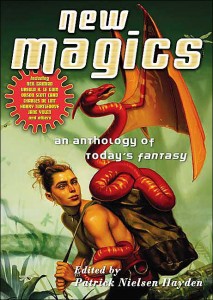 In the same spirit as Hayden’s previous YA anthology for Tor, New Skies (which covered science fiction), New Magics collects some of the very best fantasy short stories from the last two decades.
In the same spirit as Hayden’s previous YA anthology for Tor, New Skies (which covered science fiction), New Magics collects some of the very best fantasy short stories from the last two decades.
Neil Gaiman’s “Chivalry” is a clever, wry look at where the Holy Grail might have ended up in modern times, as well as the noble knight who still seeks it. How can anyone defeat the Grail’s new guardian, a kind old woman with an eye for propriety? “Charis” is an all-too-rare story by Ellen Kushner, reprinted from the excellent Borderland series (edited by Terri Windling). In a city on the edge of the modern world, where humans and elves mingle in a magical, musical, unpredictable town, just about anything can, and does happen. Susan Palwick tackles a truly unusual subject, as she mixes fantasy and literary speculation in “Jo’s Hair,” a subtle piece that follows the chopped-off hair (and the money paid for it) of the main heroine of Little Women.
Debra Doyle and James McDonald tell a story of Peter Crossman, modern-day Knight Templar, in “Stealing God.” Part detective story, part spy story, it’s a sharp and quirky adventure. Jane Yolen’s “Mama Gone” is a short, creepy piece about a woman turned into a vampire, and how it affects the family she’s left behind. Charles de Lint gives us another tale of the mythical North American city Newford, in “The Bone Woman,” in which the mysteries of the titular character are explored, and revealed. Ever wonder what happens to the parents left behind when children go off to some magical land to have great adventures? In Sherwood Smith’s “Mom and Dad at the Home Front,” a mother and father struggle with how much freedom to allow their wayward children, and whether they have the right to protect them from their dreams. Emma Bull’s “A Bird That Whistles” serves as a prequel to her classic War For The Oaks, detailing an important emotional turning point for one of the book’s main characters.
Stories by Harry Turtledove, Andy Duncan, Orson Scott Card, and Ursula K. LeGuin round out this excellent collection of top-notch authors and fantastic stories. Some of these stories have never been reprinted before, and they come from such diverse sources that it’s worth picking up this anthology just to have them all in the same place.
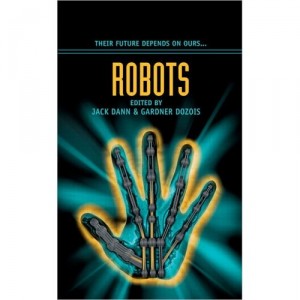 This is the latest in an ongoing series of theme reprint collections edited by Dann and Dozois, and as always, the title is self-explanatory. With nothing older than twenty years, and most of the stories published within the last ten, it’s a nice compilation of some of the more intriguing robot-themed stories to be found out there. Of particular interest are Mike Resnick’s “Robots Don’t Cry,” Chris Beckett’s “La Macchina,” Geoff Ryman’s “Warmth,” Michael Swan wick’s “Ancient Engines” and Howard Waldrop’s “Heirs of the Perisphere.” Undoubtedly, short fiction readers will have stumbled across some, if not most, of the stories reprinted here, but there are a few that may have gone overlooked. They do a lovely job of covering a wide variety of tones and themes, with something of an emphasis on how mankind and robots interact, and what they mean to one another. From the robot that would not leave the girl he was charged to care for, to the young man seeking out the robot caregiver of his youth, to the bizarre journey of a trio of animatronics, there’s something for everyone here.
This is the latest in an ongoing series of theme reprint collections edited by Dann and Dozois, and as always, the title is self-explanatory. With nothing older than twenty years, and most of the stories published within the last ten, it’s a nice compilation of some of the more intriguing robot-themed stories to be found out there. Of particular interest are Mike Resnick’s “Robots Don’t Cry,” Chris Beckett’s “La Macchina,” Geoff Ryman’s “Warmth,” Michael Swan wick’s “Ancient Engines” and Howard Waldrop’s “Heirs of the Perisphere.” Undoubtedly, short fiction readers will have stumbled across some, if not most, of the stories reprinted here, but there are a few that may have gone overlooked. They do a lovely job of covering a wide variety of tones and themes, with something of an emphasis on how mankind and robots interact, and what they mean to one another. From the robot that would not leave the girl he was charged to care for, to the young man seeking out the robot caregiver of his youth, to the bizarre journey of a trio of animatronics, there’s something for everyone here.
 Now in its 8th year, the Strange New Worlds short story contest has proven to be a great way for Pocket to find new Star Trek writers. Already, a number of past winners have graduated to writing for the myriad fiction lines, and I’m sure we’ll see more yet to come. It’s not easy trying to turn out a professional-quality story in a shared universe with so much history and continuity behind it, trying to tell something new without actually making any changes to established characters, and so my hat’s definitely off to those authors appearing in this collection. The stories cover all of the major Star Trek eras, focusing upon the five television series to date, as well as a final section entitles Speculations, for stories which don’t fit into continuity neatly. It’s probably ironic that the grand prize winner for this year’s contest, then, as well as the second place winner, both fall into the Speculations category.
Now in its 8th year, the Strange New Worlds short story contest has proven to be a great way for Pocket to find new Star Trek writers. Already, a number of past winners have graduated to writing for the myriad fiction lines, and I’m sure we’ll see more yet to come. It’s not easy trying to turn out a professional-quality story in a shared universe with so much history and continuity behind it, trying to tell something new without actually making any changes to established characters, and so my hat’s definitely off to those authors appearing in this collection. The stories cover all of the major Star Trek eras, focusing upon the five television series to date, as well as a final section entitles Speculations, for stories which don’t fit into continuity neatly. It’s probably ironic that the grand prize winner for this year’s contest, then, as well as the second place winner, both fall into the Speculations category.
All in all, it’s a strong collection of Star Trek stories, sure to appeal to Trek fans. They do suffer from the limitations inherent in the contest, focusing on major characters only and unable to actually make any sort of changes to the universe as a whole. But as self-contained episodes in the Trek universe, they succeed nicely. I’ve read enough of this anthology, and the previous entries in the series, to recognize a good thing when I see it. Here’s looking forward to number 9 and beyond.
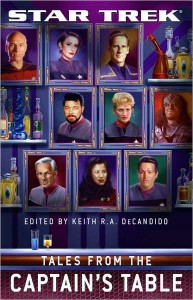 Following on the heels of their Tales from the Captain’s Table miniseries from a few years ago, a group of Star Trek authors have turned in a whole new collection, featuring many of the newer captains added to the literary canon. The concept remains the same: somewhere outside of normal space and time, there’s a bar where only captains can go, and where the price of a drink is a story of some sort. It’s a place where captains from any time, place or race, be they seafaring or space faring, get together to have a good time and spin some yarns.
Following on the heels of their Tales from the Captain’s Table miniseries from a few years ago, a group of Star Trek authors have turned in a whole new collection, featuring many of the newer captains added to the literary canon. The concept remains the same: somewhere outside of normal space and time, there’s a bar where only captains can go, and where the price of a drink is a story of some sort. It’s a place where captains from any time, place or race, be they seafaring or space faring, get together to have a good time and spin some yarns.
Having covered all the traditional Star Trek captains in the last go-around, the authors were forced to stretch a little this time, but with the expansion of the Star Trek fiction line, we’ve seen a nice crop of new captains. Thus, there are stories told by and about Jonathan Archer of the first Enterprise, Chakotay from Voyager, David Gold from S.C.E’s U.S.S. da Vinci, Kira from Deep Space 9, Klag from the I.K.S. Gorkon, Picard in his Stargazer days, Riker as the new captain of the U.S.S. Titan, Shelby from New Frontier’s U.S.S. Trident, and Demora Sulu from the U.S.S. Enterprise B. It’s an interesting selection of characters, and a fair representation of the diverse Star Trek fiction Pocket’s been putting out of late. It’s certainly an all-star cast of Trek writers, including Christie Golden, John J. Ordover, Michael Jan Friedman, Peter David, and Michael A. Martin and Andy Mangels.
The stories themselves are generally pretty good, ranging from the serious to the overblown to the comical (Archer’s story, in particular, goes right over the top and keeps on going, intentionally). Were it not for the fact that some of these stories seem to play fast and loose with reality (as captain tales sometimes must) I’d suggest this to be the perfect sampler of Star Trek fiction, since we have representatives from just about all of the fiction lines being supported at the moment. It’s an entertaining collection, and one that should appeal to even the most casual of Trek fan, though I’m not sure how well it would serve as an entry-level book. Certainly, I think we can expect to see another volume once they’ve accumulated more captains with stories to tell.
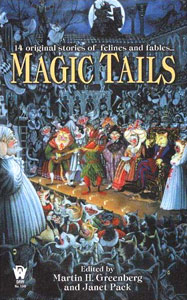 Take your classic collection of fairy tales. Add one part humor, two parts fantasy, and a whole lot of fanciful felines. Shake. Serve. That’s the recipe for this clever collection, in which fourteen authors retell their favorite fairy tales, from the viewpoint of the cat. If there was no cat the first time around, they add one or two. From retold tales to all-new ones, from quirky reinterpretations to sequels, they manage to add a whole new angle to some old favorites.
Take your classic collection of fairy tales. Add one part humor, two parts fantasy, and a whole lot of fanciful felines. Shake. Serve. That’s the recipe for this clever collection, in which fourteen authors retell their favorite fairy tales, from the viewpoint of the cat. If there was no cat the first time around, they add one or two. From retold tales to all-new ones, from quirky reinterpretations to sequels, they manage to add a whole new angle to some old favorites.
Alan Dean Foster gets the ball rolling in “Ali Babette.” When a woman finds a magic pillow, she ends up releasing a djinn, all right. A djinn of the cats, one capable of granting only the wishes cats would make. Her attempt to find satisfaction under such restrictions showcases a nice twist on the usual “three wishes” routine. Elizabeth Ann Scarborough’s “Cat Among the Pigeons” gives the fortune-seeking soldier of “Twelve Dancing Princesses” fame a feline companion to help him solve the mystery of the worn-out shoes and exhausted maidens. Now, if Charles de Lint’s “Dark Eyes, Faith, and Devotion” follows the pattern of any specific fairy tale, it’s not one I’m familiar with. In it, he returns to his signature setting of Newford, where an unlicensed cab driver gets a very unusual fare, an attractive woman who asks him to help her rescue her cat. However, there’s something stranger going on below the surface, as our hero soon discovers.
Jody Lynn Nye’s “Sleeping Beauties” looks as the titular sleeping princess, and the cat sworn to protect and serve her, and the lengths to which he goes to find a suitable prince to break the curse during her years of enforced slumber. Edward Carmien’s “The Devil’s Bridge” has an old woman, the Devil, a cow, and a cat, and a sinister bargain. Jean Rabe’s “Suede This Time” picks up where “Puss In Boots” left off, with a whole new crop of unpleasant ogres to deal with. However, in dealing with the ogres who have secretly invaded the castle, a new light is shed upon the nature of Puss’ owner, whose gratitude, it seems, has its limits. We also get a new version of “Sleeping Beauty” in Andre Norton’s “The Cobwebbed Princess.”
A cat is used to save the day in a twisted version of “The Three Little Pigs” in Mickey Zucker Reichart’s twisted retelling, “All The Pigs’ Houses.” I somehow suspect the cat might object to the manner in which it’s used to thwart the blowhard wolf bent on pork for dinner, though. Michelle West and Debbie Ridpath Ohi turn their attentions to another old favorite, “The Show Queen,” in which a cat plays its own part in reuniting two long-separated friends. Authors such as Josepha Sherman, Richard Lee Byers, Edward Serken, and Bruce Holland Rogers round out the list of contributors.
I love cats, and I love fairy tales, so there was pretty much no way this anthology could fail with me. With some excellent authors, and some highly imaginative stories to choose from, this collection didn’t let me down in the least, and I was more than satisfied with its offerings. If you like fantasy or felines, this one’s sure to appeal. Give it a shot.
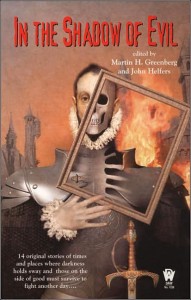 What is it about the dark side that fascinates us so? What compels us to occasionally root for the bad guy, and why do we love to watch the villain at work? These are some of the questions that drive the stories in this collection, an anthology which focuses its sights on worlds and places where “evil” is winning or has already won. Be they willing servant or the bitterly enslaved, the protagonists of these stories all live under the yoke of what we (or they) would consider evil.
What is it about the dark side that fascinates us so? What compels us to occasionally root for the bad guy, and why do we love to watch the villain at work? These are some of the questions that drive the stories in this collection, an anthology which focuses its sights on worlds and places where “evil” is winning or has already won. Be they willing servant or the bitterly enslaved, the protagonists of these stories all live under the yoke of what we (or they) would consider evil.
Tim Waggoner turns in a thoughtful story, “To Embrace the Servant.” In it, a master perfumer lives from month to month as he struggles to constantly appease a strange snake god with new scents. However, his attempts to find a better life for his daughter may end in tragedy, if he doesn’t watch his step. Russell Davis’ “The Angel Chamber” is a disturbing story told from the viewpoint of a young girl faced with a kind of death. Whether it’s fantasy, science fiction, or horror all depends on your viewpoint, and how you interpret the narrative. I will allow that it involves a real evil, though. Isaac Szpindel’s “Ineffable” looks at how, in fighting monsters, it’s easy to become one, as a rabbi pushed past his moral limits creates a golem to fight a horrifying war for him, even as the golem chafes at his bonds of servitude.
Julie Czernada’s “Peel” looks at a world where evil has triumphed, and then lost all sense of purpose. What -does- evil do when there’s nothing left for it to fight or subjugate? Gregory Benford’s “Iraqi Heat” turns a timely eye towards a land where evil has seeped into the land for so long, the land itself is starting to fight back. Told from the viewpoint of some American soldiers sent far from home to fight and die in a place not their own, this story features some very unusual instruments of justice. Tanya Huff’s “Slow Poison” follows a cook forced to serve a brutal warlord who’s killed her king and conquered the area. Forced to serve or die, the cook concocts a cunning, and subtle plan to protect her people and ultimately dispose of the gluttonous warlord.
Obviously, there are some very strong stories in this collection, with authors such as Jane Lindskold, Fiona Patton, Michelle West, Mickey Zucker Reichart, and Jody Lynn Nye also contributing. With stories tackling evil in the real world and in fantasy worlds, it’s a strong collection that really takes advantage of the theme to tell some daring, and thoughtful, tales. Mostly fantasy, it’s also got some definite horror elements woven throughout it. It’s worth checking out.
